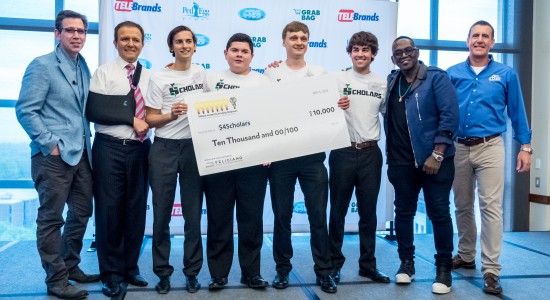In the Spring 2015 semester, four students at Montclair State University won a $10,000 prize to launch their startup business idea in a contest between six groups of entrepreneurial students.
Montclair State University has a nine-credit Certificate of Entrepreneurship program, consisting of three interactive classes that give students real-world entrepreneurial skills and experiences. All students involved in the program have the opportunity to present a business plan for the annual Feliciano Center student pitch competition.
The competition is sponsored by TeleBrands, whose President and CEO AJ Khubani is an MSU alumni, and takes place at the annual TeleBrands Inventors Day for Aspiring Entrepreneurs, held in May of each year.

The Spring 2015 winners and celebrities Todd Pettengill, Randy Jackson and Anthony Sullivan.
Photo Credit: Mike Peters
Jean Camacho, a senior, was the CEO of the winning startup company of May 2015’s competition. The group initially called their business Dollars for Scholars, but they have changed the name and are currently in the process of having it officially trademarked. The company’s goal is to allow college students to connect with homeowners in their local communities through employment, so students can get jobs to support themselves while helping homeowners by completing small tasks and projects such as construction, around-the-house maintenance, painting, etc.
According to Camacho, his start-up team will get their trademark and launch their company within the next few months. The company will also open employment to current Montclair State students to be project coordinators in different locations. In order for the idea to work, the people who need help will tell the coordinator who can then find someone in the area who is able to provide the time and effort as well as has the expertise required to complete the job at hand.
One of the professors in this program, Jason Frasca, is an entrepreneurial instructor and start-up mentor in the Feliciano Center for Entrepreneurship in the School of Business. He also happens to be Camacho’s group’s official business advisor and their professor in Startup Business Model, one of the classes in the entrepreneurial certificate program. As Frasca states, “We don’t want anyone to go through our program and just wave goodbye to them. We want to nurture them and provide them with the resources needed to build a successful business.”
This component of continued education is a large part of the program. According to Camacho, “This program has helped us cultivate ideas that are already within us. Thanks to the Feliciano Center, we have the tools to allow our startup to go beyond our four year education and we will go as far as we can with this project.” After they complete their courses, all student teams have continued access to the Feliciano Center tools, including a continued mentorship program, a 3-D printing lab and an incubator to help with their start-up ambitions.
The program’s trajectory of growth indicates that students agree with the execution of this program. It is only in its third year, but the pitch competition went from four groups to 10 the second year. Later this year, between 25 and 40 start-up groups are anticipated to participate in the program.



